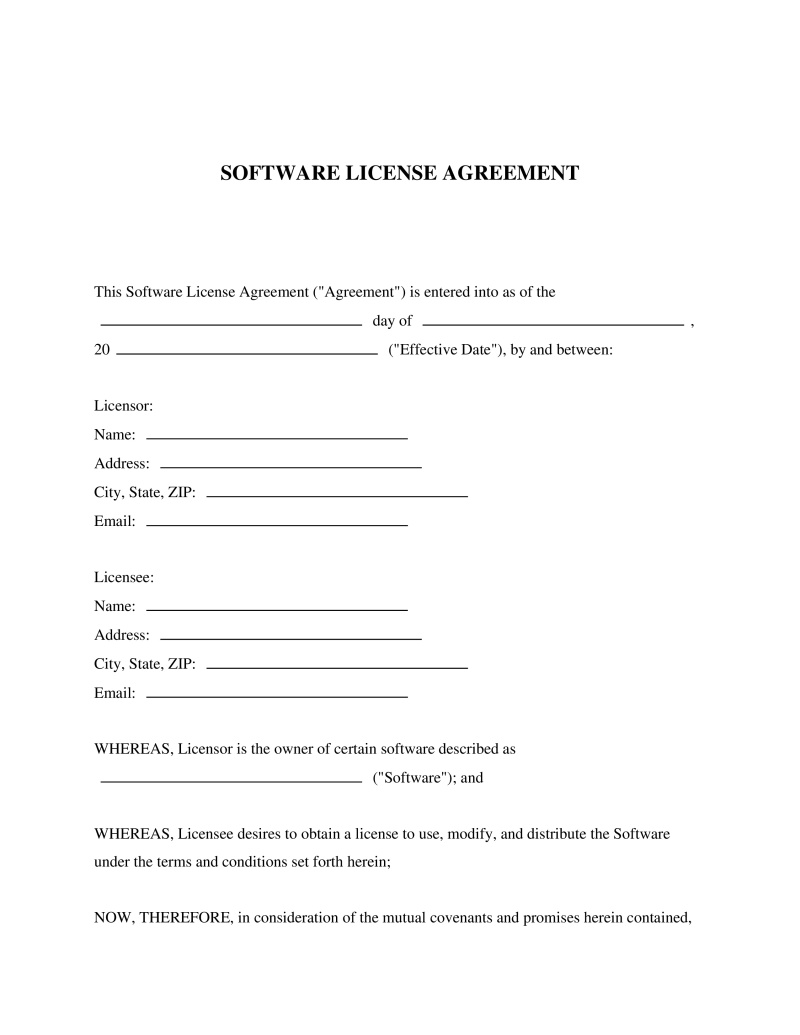A Software License Agreement is a legal contract granting permission to use software under specified conditions and restrictions.
Licensor Name
Enter the full legal name of the party granting the license.

Table of Contents
What is a Software License Agreement?
A Software License Agreement is a legally binding contract between the developer or publisher of software and the end-user, establishing the user's rights to use the software. This document outlines the scope of what the user can do with the software, such as whether they are allowed to install it on multiple devices, if they are permitted to make copies, or modify it. It also details the limitations and restrictions imposed by the licensor. Individuals or businesses seeking to license software, either for personal use, commercial distribution, or development purposes, need this agreement to ensure clarity about rights and responsibilities, thereby avoiding potential legal disputes. The importance of understanding and negotiating the terms of this agreement cannot be understated, as it protects proprietary rights while ensuring users understand their obligations.
Key Features
Important Provisions
- Grant of License: Specifies what rights are being licensed to the user and any restrictions on those rights.
- Intellectual Property Rights: Clarifies ownership of the software and related intellectual property, emphasizing that licensing does not transfer ownership.
- Warranties and Disclaimers: Details any assurances given by the licensor about the software's performance and outlines scenarios where liability is limited.
- Termination: Explains under what conditions either party can terminate the agreement and what happens upon termination.
Pros and Cons
Pros
- +Ensures legal clarity and compliance for both licensors and users regarding software usage.
- +Reduces potential legal disputes by clearly outlining permitted uses and restrictions.
- +Protects intellectual property rights while allowing for controlled distribution and use.
- +Facilitates scalability by allowing for amendments as software updates or business needs evolve.
- +Provides a framework for enforcement actions in case of license violations.
Cons
- -May require negotiations to reach an agreement that suits both parties' needs effectively.
- -Could be seen as restrictive by users not familiar with licensing agreements, potentially affecting user adoption rates.
- -Needs regular updates to remain relevant with technological advancements and changes in law.
Common Uses
- Licensing software for personal use, ensuring users understand their rights and limitations.
- Granting permissions for commercial distribution by resellers or distributors.
- Allowing third-party developers access for developing add-ons or integrations.
- Providing enterprise licenses for organizations to use software across multiple devices or locations.
- Facilitating subscription-based access to cloud-based applications or platforms.
- Enabling academic institutions to distribute educational software to students and faculty.
Frequently Asked Questions
Do you have a question about a Software License Agreement?
Example questions:
Not the form you're looking for?
Try our legal document generator to create a custom document
Community Discussion
Share your experience and help others
Legal Notice: Comments are personal opinions and do not constitute legal advice. Always consult a qualified attorney for matters specific to your situation.
Comments (0)
Leave a Comment
No comments yet. Be the first to comment!